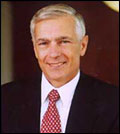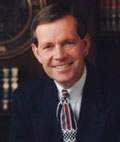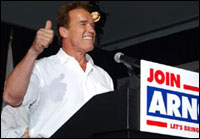
The man of the hour.
Photo: Clark for President.
Days after entering the presidential race, Wesley Clark is dominating the public opinion polls — surpassing not only fellow Democratic candidates but also President Bush in approval ratings. Forty-nine percent of registered voters in the CNN/USA Today/Gallup poll released Monday said they’d vote for Clark, compared with 46 percent for Bush. Indeed, there seems to be little doubt that if anyone can unscramble the dangerous muddle that is the Bush administration’s foreign policy, Clark is the guy: former commander of NATO, West Point valedictorian, Rhodes scholar, decorated Vietnam vet, military mastermind behind the Kosovo mission, and, from the get-go, an influential critic of the Bush administration’s Iraq invasion.
But can he reverse the course of Bush’s environmental offensive? Having spent most of his life in camouflage — trying to look like trees, not save them — Clark clearly doesn’t have much experience with environmental policy in his holster.

A tortoise looking for some privacy.
Poster: USFWS.
Or does he? During a luncheon for Clark two weeks ago at the New York offices of Rolling Stone magazine, an editor pressed Clark on his environmental background — whereupon the would-be prez flashed a big smile, rubbed his hands together, and beamed as he talked about the “hands-on” environmental experience he had gotten in the U.S. Army. (Rolling Stone is running a transcript of Clark’s luncheon address in its next issue.) He launched into a vignette about being the first commander to catch an oil drip coming off tanks, averting groundwater pollution. Also, he said, he led the effort to keep soldiers from harming the threatened desert tortoise, which has the unique problem of peeing every time it is touched and then dying from dehydration. (Clark used the phrase “going to the bathroom,” which was tender, but, in the case of most tortoises, not technically an option.)
The heart of any seasoned (or even not-so-seasoned) environmentalist might have sunk during these vignettes, as they seemed more akin to preparing for a game of Nerf ball than for the grisly sport that is Beltway environmental politics. But Clark segued into the bigger issues confidently, sounding lucid and determined about the need to shift away from fossil fuels and insisting on his opposition to drilling in the Arctic National Wildlife Refuge. He expressed deep disappointment with the Bush administration’s treatment of the Kyoto Protocol on climate change — they should never have pulled out, he said, but rather worked to fix it — and added with ardor that the United States must be the world leader in the fight against global warming. He also insisted that he “believed” in clean air, water, forests, and wetlands. It all seemed very heartfelt, but also distinctly naive to the dirty details of environmental policy-making and to the formidable industry opposition any environmentally minded president is sure to face.
Such was the concern of one guest at a private 40-and-under Clark fundraiser at a home in Manhattan’s SoHo neighborhood Monday night. Alisa Volkman, a 30-year-old magazine executive and member of the group that helped organize the event, said that Clark’s commentary on green matters was perfunctory at best: “I love Clark, but I must say that he spent less time on the environment than any other issue — probably about three sentences total. It seemed like he hadn’t put his ideas together on the matter and wasn’t able to talk about [the policies] in detail,” she said. “He did start talking about some kind of endangered desert turtle with a urinating issue, but no one really got it so he moved on.”
The League of Conservation Voters, which has compiled some excerpts of Clark’s commentary on environmental matters on its website, said in an insider memo that despite his apparent lack of experience, Clark has “a worldview we salute,” noting in particular a quote cited on the Draft Wesley Clark website: “One hundred years out, the only things we leave behind that will matter are the environment and constitutional legitimacy.” No doubt, such a worldview is infinitely more enlightened than what we’re seeing from the current powers that be. At the very least, it seems Clark would be likely to appoint someone with a thorough commitment to sustainability and detailed understanding of environmental policies to head his EPA — even if on these matters he personally comes up short.
They Like Mike
Speaking of appointments: Yesterday’s three-and-a-half-hour confirmation hearing on the nomination of Utah Gov. Michael Leavitt (R) to head the U.S. EPA confirmed GOP fears that the Democrats and some media outlets would use the opportunity to slam Bush’s environmental record. Meanwhile, it also confirmed liberal fears that everybody loves Leavitt.

One popular guy.
Photo: Utah governor’s office.
“There was a fairly universal expression of disgust among Democrats to Bush’s environmental policies … [but] there was an overwhelmingly positive response to Leavitt personally,” said Chris Miller, a staff member at the Senate Environment and Public Works Committee, which will be voting next week on whether to approve the nomination. “Most of the committee members [including those who are threatening to block Leavitt’s nomination] met with him privately and liked him.”
Miller predicts that the committee will grant approval (which only requires a simple majority vote), but then the nomination has to go to the Senate floor to be confirmed. That’s the point at which Sens. Hillary Clinton (D-N.Y.), Joe Lieberman (D-Conn.), John Edwards (D-N.C.), and others could move to block the confirmation if the White House fails to provide the information they have requested about pollution at Ground Zero, changes to the Clean Air Act, and more.
“Leavitt is probably up for some tough sledding ahead,” said Miller. But there’s no question that he’s won the personality contest, which will make it all the more difficult for Democrats to drag their complaints out in the coming months. “A visionary … tenacious … innovative … and solution-oriented,” is the way Sen. Bob Bennett (R-Utah) described Leavitt. Other Republicans such as Sen. Orrin Hatch (R-Utah) were equally gooey, but even Democrats such as Harry Reid of Nevada (who has also threatened to block the nomination) waxed warm and fuzzy. Reid used most of his five-minute address to tell a story about Leavitt’s likable dad, who sold Reid health insurance and then years later personally reimbursed him for maternity expenses that the insurance failed to cover.
Several senators also referenced an editorial published by former Maryland Gov. Parris Glendening in the Washington Post on Saturday, entitled “The Right Choice for the EPA,” which praised Leavitt’s strong record on controlling suburban sprawl in Utah. Glendening, a Democrat who himself has a very strong environmental record, shed some light on Leavitt’s powers of persuasion in an interview with Grist. “I know him well, I’ve worked with him closely, and can tell you he has a fair and balanced view of the environment and in some areas very progressive environmental policy,” said Glendening. “He [also] has a powerful personality. He’s very intelligent, extraordinarily articulate, and projects a strong sense of confidence and determination.”
Unfortunately, Leavitt seems to be determined mostly in ways agreeable to the Bush administration. He believes in stepping up energy production on federal lands, for instance, and moving away from command-and-control regulations. Still, on some issues — such as smart urban growth and air pollution, on which Leavitt was active as governor — he may have a bit more gumption than former EPA Administrator Christie Todd Whitman. “Will he be challenged when trying to get some of his [progressive proposals] past the White House? I think definitely yes,” said Glendening. “But will we [environmentalists] at least have a clear voice at the table, and occasionally have some wins? I think yes as well.”
Pumping Hydrogen
“By the end of this decade we will have hundreds of thousands of cars driving with hydrogen fuel rather than fossil fuel,” announced none other than Arnold Schwarzenegger last Sunday. No, this was not a speech in a science-fiction movie, but it might as well have been one: As yet, there are only a few dozen fuel-cell test vehicles on the roads, and it will take several years at least to get the first models into production. In a thrilling but unrealistic PR stunt at a gubernatorial campaign appearance just outside of Los Angeles, the Terminator star promised to create a public-private partnership to build hydrogen fueling stations for fuel-cell cars every 20 miles along major interstate highways in California by 2010 — a bold vision, to be sure, but a project that would be so staggeringly elaborate and expensive to execute that it can only be called preposterous.

Say Ahhh-nold.
Photo: Schwarzenegger for Governor.
“You would need superheroes, a prop department, and Hollywood’s best special effects to pull off what he wants to do by 2010,” said Joel Makower, cofounder of the clean-energy consultancy Clean Edge, Inc. “There are no credible experts in this field that would endorse a plan like this. It’s as though somebody said to Arnold: ‘If you could create a sci-fi energy world in which you were the star, what would it look like?’ And he and his scriptwriters whipped this one up.”
In a way, it’s charming that Schwarzenegger has this ecotopian fantasy, but just as with Bush’s fuel-cell proposal, some energy experts smell a red herring: Both plans overlook the urgent, short-term need to put fuel-efficient cars on the road today and fail to address the importance of finding clean ways of producing hydrogen. (Schwarzenegger’s proposal would presumably derive hydrogen from natural gas, since that is the only technology that’s readily available today.)
What inflates the absurdity of Schwarzenegger’s plan was his promise to retrofit his own gas-guzzling Hummer with a fuel-cell engine. That vision completely misses a basic rule of fuel-cell vehicles, one obvious to anyone who has even a passing familiarity with the technology: Fuel-cell cars need to be light and aerodynamic (i.e., not a tank), requiring the minimal amount of power — and the minimal size fuel cell — to propel them. “It would probably take a fuel cell the size of a VW Beetle to fully power that thing,” says Makower.
But Schwarzenegger’s energy proposal certainly has it merits; at the very least, it boosts fuel-cell sex appeal, if only among the Monster Truck crowd. More important, it includes an ambitious and praiseworthy goal of requiring half of new houses in California to incorporate solar energy by 2005. That alone is exciting enough to merit a sequel.

